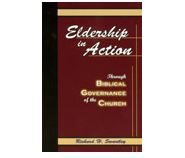Richard Swartley has tackled some thorny issues in his practical companion manual to Alexander Strauch’s more exegetical study, Biblical Eldership. More and more churches are coming to theoretical agreement that the NT teaches a governance model of plurality of elders. However, the traditional senior pastor model is so firmly entrenched that churches try to convince themselves that they are in conformity with that biblical paradigm while continuing to make concessions based on arguments of expediency. Swartley cuts through the rhetoric to grapple with the practical sticking points that truly differentiate how serious an effort is being made to implement this model.
Some of the key topics / questions addressed include:
-
examining distortions of the biblical model
-
can the NT model really work in today’s culture
-
how can this model work effectively in churches of different sizes
-
how should elders be recognized
-
how should the elder council be organized and function
-
what should be the relationship of the elders to people in staff positions
-
how can you implement the strategic planning process
-
what level of consensus needs to be the standard for decision making
-
how can you conduct efficient meetings
Swartley concludes:
My prayer is that this work will encourage the adoption of a model of church leadership that is both biblical and productive. For too long we have acquiesced in the belief that the apostolic directives for the leadership and governance of the church were culturally bound to the early church period. Instead, we now know that those instructions were grounded in the apostles’ fundamental understanding of the nature of the church and God’s intentions for her. These imperatives are immutable. The church is the body of Christ, God’s household: it was never intended to be a hierarchical institution in which power was vested in a select few – relegating those men who should be active in leadership as elders to a passive role.
This is a must read for all men in positions of church leadership. (The fact that the author graciously recognizes me in his “Acknowledgments” for my limited input and assistance should not invalidate my recommendation!)
For other reviews and information on ordering, check out the Amazon site or the book can be obtained from Emmaus College Press (1.888.338.7809).

